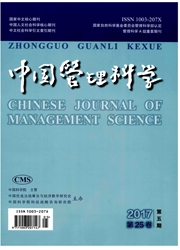

 中文摘要:
中文摘要:
在由一个供应商和一个零售商组成的两级分散供应链中,供应商通过制定最小订购量取得规模效应,保障自身利益。当零售商和供应商之间存在需求信息不对称时,即零售商掌握需求信息而供应商仅知道需求信息中价格敏感因子的分布,如何进行最小订购量决策成为供应商面临的一个重要问题。针对这一问题,从营销视角构建了基于Stackelberg博弈的利润最大化模型。假设供应商知道需求的价格敏感因子服从正态分布,通过严密的数学推导确定了模型中的最优最小订购量。将提出的最优最小订购量决策方法应用于云存储的销售供应链中,确定了云存储供应商销售的最优最小存储容量,阐释了方法的合理性与有效性。通过实验研究发现,最小订购量的设置提升了供应商的利润。所提方法对于考虑最小订购量的供应链协调研究具有积极的推动作用。
 英文摘要:
英文摘要:
In a two-hierarchical decentralized supply chain composed of a supplier and a retailer, the suppli- er generally protects his/her own profits by means of determining minimum order quantity (MOQ). Some- times demand information is asymmetrical between the supplier and the retailer; that is, the retailer cat- ches the complete demand information but the supplier only knows the distribution of price-sensitive factor in the demand information. In this situation, how to determine MOQ becomes an important problem that the supplier faces. For this problem, from the marketing point of view, a profit maximization model is constructed based on Stackelberg game. Suppose the supplier knows that the price-sensitive factor in the demand follows normal distribution. The optimal MOQ in the model is then determined by strict mathe- matical deduction. The proposed determination method of the optimal MOQ is applied in the sales supply chain to determine the optimal minimum storage capacity sold by cloud storage supplier, which demon- strates the rationality and validity of the proposed method. Experimental results show that setting MOQ by the proposed method exactly increases the profits of the supplier. More important, the proposed meth- od can significantly promote the research on supply chain coordination considering MOQ.
 同期刊论文项目
同期刊论文项目
 同项目期刊论文
同项目期刊论文
 An interval difference based evidential reasoning approach with unknown attribute weights and utilit
An interval difference based evidential reasoning approach with unknown attribute weights and utilit Determining attribute weights to improve solution reliability and its application to selecting leadi
Determining attribute weights to improve solution reliability and its application to selecting leadi 期刊信息
期刊信息
